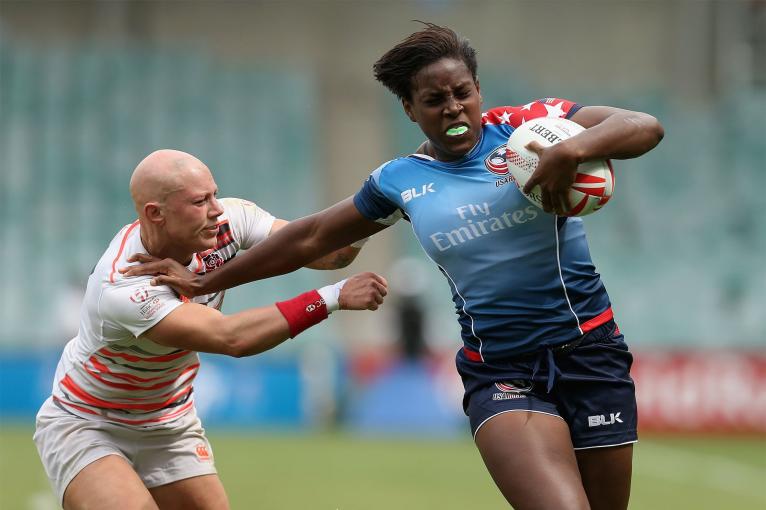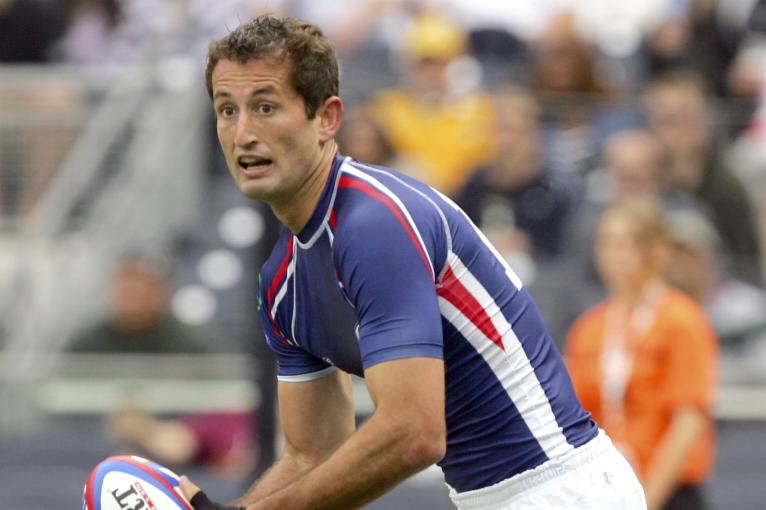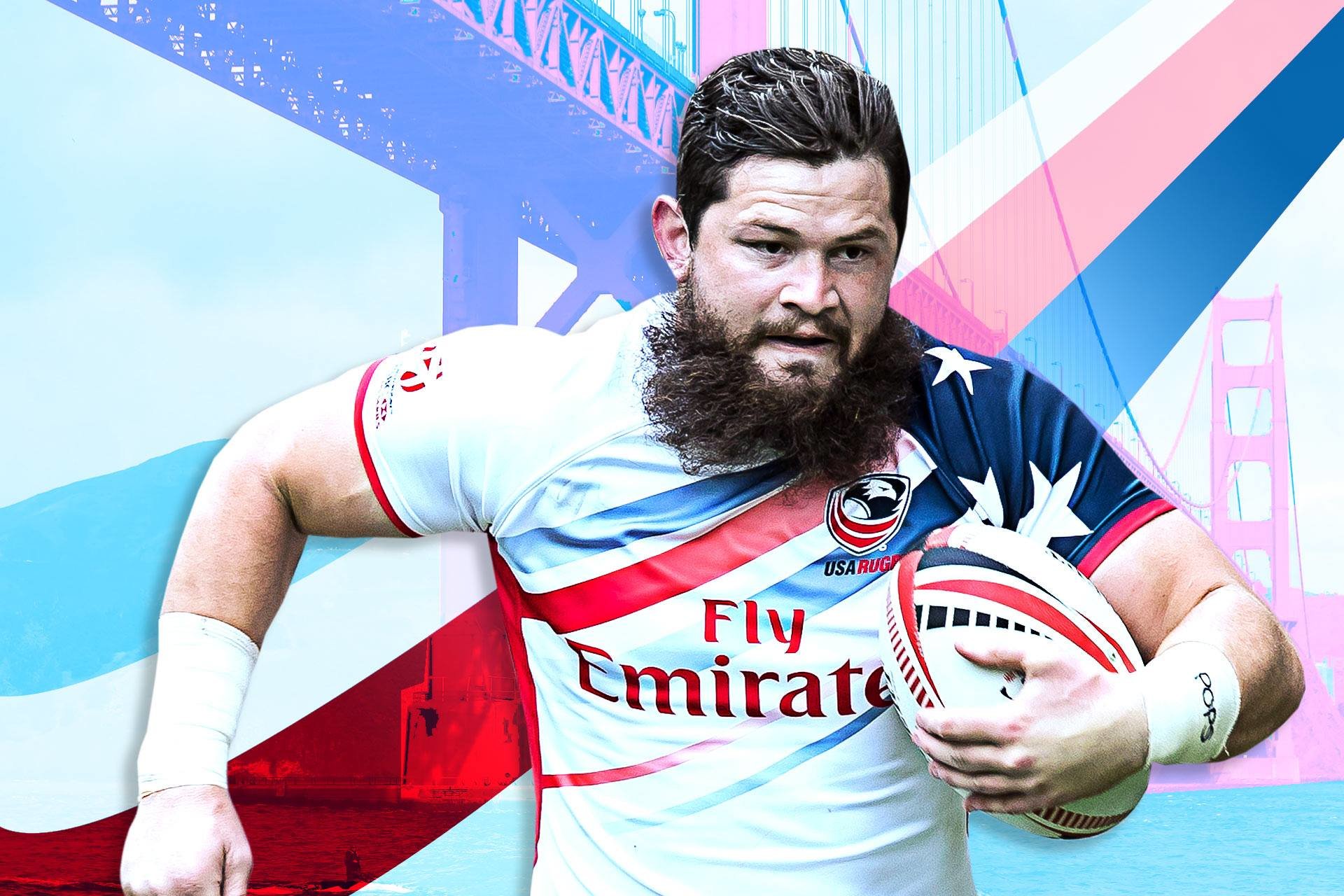When the USA Eagles march on to the field at San Francisco’s AT&T Park in July, they will be representing more than the stars and stripes spread proudly across their chests.
They will represent the tremendous progress that the game of rugby has made in the world’s third most populous nation.
In just three months’ time, the United States will host the Rugby World Cup Sevens for the first time ever.
Former USA sevens representative and current HSBC Sevens World Series commentator Dallen Stanford believes that hosting a World Cup provides a tremendous opportunity to expose and grow the game even further in the United States.
“What’s so important about the US hosting is that the non-rugby person gets the chance to take part in terms of watching or going to the event,” said Stanford. “I think that’s where we are lacking here in the US, is the exposure for the rest of the country.”
“The Olympic Games touched on it, it didn’t quite get the reach and results.
“The results on the field for both the men and women weren’t on the podium where the American fan would see that and say okay, this is my new sport to watch, follow or play. I think now with the sevens and with our teams doing so well – the men and women – there is a chance to achieve one of the top three spots. I think that’s a massive opportunity.
“People like Naya Tapper or Alev Kelter, or Perry Baker and Carlin Isles and Danny Barrett, those players that got a chance to get into the game, there are hundreds and thousands more athletes like that who could pick up the ball after they see this game.”

Current USA Eagle Danny Barrett shares Stanford’s sentiments, and believes that San Francisco provides the perfect platform for rugby sevens to shine in the United States.
“I think they’ve picked the perfect place for it, first of all,” Barrett said.
“The Northern California Bay Area is one of the biggest hotbeds in the country and to be there and have this great sport, this great sporting event at a stadium where the San Francisco Giants are a pretty successful franchise as well – they’ve won quite a few World Series’ this decade – I think it’s important that they have an iconic venue holding an iconic tournament.
“Just from there, I think that if we play well that’s really what’s going to get people involved,” Barrett continued.
“San Francisco itself is just an awesome city for it. It’s going to be amazing, I can’t really put it into words.”
San Francisco bears special significance for Barrett and several of his teammates.
“Folau Niua is from East Palo Alto, Matai Leuta’s from Monterey. We’ve got a couple of boys from the Sacramento area, kind of all around that whole Bay Area,” Barrett recalls.
The 28-year-old grew up just ten minutes from the city and played his junior rugby all over the Bay Area.
“I grew up in Pacifica, which is more or less ten minutes south of San Francisco, I went to high school downtown. Played my high school rugby over at Golden Gate on Treasure Island and then from there I went to Cal with my brothers.
“Played there for five years and then a week after I graduated I got a contract to come down to join the sevens programme and I kind of jumped at that. And then here we are now.”
Now, Barrett is one of the world’s best.
Easily recognisable on the pitch thanks to his hulking 1.9-metre frame, barnstorming runs and signature beard, Barrett was named to the HSBC World Series 2017 Dream Team alongside teammate and reigning World Rugby Sevens Player of the Year Perry Baker.

The Northern California influence hasn’t been lost on Barrett’s game.
“The Northern California aspect of it is huge. There’s a lot of Polynesian influence in the game, at Golden Gate, just kind of in the league in Northern California. For me it’s fantastic. I’m really homegrown in the sport, everything I learned was from someone from the Bay Area.”
Playing in front of a home crowd has also proven to have an enormous impact on the play of the USA men’s sevens team, and they are hoping that impact carries over for the World Cup.
“I think we kind of showed that over the last few years in Vegas. We’ve had three or four straight semi-finals and then to finally get over that hump and win it this year, I think the crowd definitely carried us quite a bit,” said Barrett.
“The big part to it is our travel is not that bad. It’s an hour flight, hour and a half flight to Vegas or San Francisco from San Diego [where the team are based]. I think that’s a big part for us.
“We can train at home, we can sleep in our own bed and it’s kind of a smash and grab job. Get in, get the job done and let’s go home.
“I think that’s something that as a group, as a squad, we like. Don’t get me wrong, we like being on tour and everything but there’s nothing like being around your loved ones and sleeping in your own bed. I think it’ll be pretty good for us.”
Stanford’s recollection of his playing days – where the main objective was to become a core team on the World Series circuit – gives perspective on just how far the team have come in such a short time.
“The US had unfortunately had a poor run of results in the seven-a-side game pre-2007. In fact I remember going as a fan to the USA Sevens tournament held in Los Angeles” Stanford recalls.
“I watched as a fan in 2005 and the US lost to Mexico and everybody else, whoever they played in that tournament. It was kind of interesting to see that.
“In 2006 I was in the reserve player pool for that tournament, the US didn’t fare much better and then Al Caravelli took over the duties as the head coach and he really turned things around for the US in the sevens game.
“What he brought to the game which we’d never had was accountability and a determination, with limited resources, to get the best results he could on the playing field.”
Under Caravelli’s reign, the Eagles went from playing bit parts in just four tournaments a season to becoming a core team on the circuit from 2009.
“I think the interesting thing from that point of view was a lot of people didn’t realise that in all those three seasons [prior to becoming a core team], our American team had other jobs,” Stanford continues.
“Every single player had to have an income outside of rugby, even somebody like Todd Clever who captained the fifteens side and was a fixture on the Sevens Series.
“That was kind of weird when your day job was something else then in the evenings after work you’d have to train and go against full-time athletes from New Zealand, South Africa and the rest of the countries. So that was kind of a big difference.”

Stanford’s era included plenty of firsts for the USA sevens team as they gradually evolved into the team they are today.
“I think when we made our first semi-finals during our [my] era, 2006-2009, and were just short of the final and then eventually made the final in Australia for the first time, I remember speaking to some players from the New Zealand team and they were like ‘you guys have the potential to do this week in and week out’, it’s now a matter of having the mindset that you’re able to beat the best teams in the world.”
Now, under former England sevens head coach Mike Friday, the USA team have arrived and are taking centre stage, week in and week out.
“Him [Friday] and Brownie [Chris Brown] and Phyllis [Phil Greening] have been immense for us. In my first season there was a couple of times where we went into tournaments and we lost five games. Five in a row and that was the end of it,” said Barrett.
“To have Mike and Brownie and Phil show up in July 2014, you’ll never forget those first three months because they were probably the hardest three months of anyone’s life that’s down here or been down here.
“They still make it pretty tough on us, but I think the support that Mike’s given us, not just on the field but off the field. Fighting for us to become a bigger nation, to get what we deserve as athletes.
“We’re going to put in that work for each other, and that’s what Mike has cultivated for us.
For Barrett, an important thing that Friday has done is put trust in his side.
“He’s trusted us on a lot of stuff. Not many times have people come in and told us that it’s our decision to do things.
“A lot of the time, the American sporting landscape is ‘here’s what you do, do as it says’, whereas Mike’s has been ‘you know what, you’re going to make your decisions, right or wrong, it’s up to the other guys to back you up.
“Make good decisions and bad decisions, just don’t make no decision. I think he’s really put it into our hands, but at the same time has moulded us into what we’ve become.”
The team have three stops left on the series circuit to fine tune their game and improve their standing before the World Cup in July.
“After Paris, that’s when we’ll really get into our World Cup prep. Take a little bit of time off, get the body right and then really dial in World Cup stuff,” Barrett said.
“Every little thing is building towards that whether we believe it or not, so that win in Vegas and to follow that up with a fourth-place finish in Vancouver, a little heart down in Hong Kong just this past weekend, but every little thing is going to push us in the right direction.”
In case you missed it:
“FIRE IN THE BELLY, ICE IN THE MIND”: WORLD RUGBY SEVENS SERIES TITLE PARTNER HSBC EXPLORES THE MIND OF A SEVENS PLAYER
Former Ireland captain Brian O’Driscoll, gold medal winning coach Ben Ryan & ex-Wallabies captain George Gregan spoke with RugbyPass ahead of the Cathay Pacific/HSBC Hong Kong Sevens.




















































